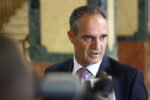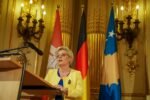French President Emmanuel Macron held a phone call today with Serbian President Aleksandar Vučić, stressing that Serbia’s European future depends on domestic reforms and continued dialogue with Kosovo. Macron also underlined the importance of Bosnia and Herzegovina’s stability and sovereignty, referencing heightened tensions following the conviction of Republika Srpska President Milorad Dodik.
“Serbia’s destiny is European, but it hinges on reforms and a spirit of dialogue. France values Bosnia’s stability and the respect for the rule of law,” Macron declared after the call.
Macron’s remarks come amid a fragile moment for the region. Just two days ago, Bosnia’s Court of Appeals upheld Dodik’s conviction, sentencing him to one year in prison and barring him from holding public office for nearly six years. Dodik was found guilty of defying decisions of the international High Representative, a critical post-war institution in Bosnia.
Following the verdict, Dodik responded on X, thanking Vučić and Serbia’s National Security Council for their support. He also issued a veiled threat, calling the ruling a “political decision” that would have “consequences,” hinting at plans to ramp up measures against Bosnia’s central government and further strengthen Republika Srpska’s autonomy.
Analysts view Dodik’s reaction as a warning of political retaliation, raising fears of escalating tensions not only within Bosnia but across the wider Balkans, especially as Serbia remains under EU pressure to maintain regional stability and progress its dialogue with Kosovo.
Why Was Dodik Convicted?
Milorad Dodik was convicted for refusing to implement the High Representative’s decisions, which oversee compliance with the 1995 Dayton Peace Accords. Specifically, Dodik ignored directives to block the publication of controversial laws passed by the Republika Srpska assembly, which challenged the authority of Bosnia’s state institutions. These laws sought to nullify rulings of Bosnia’s Constitutional Court and limit the powers of the international envoy — moves seen as steps toward secession.
The conviction — confirmed on August 1 — is one of the most significant legal actions against a senior political figure in Bosnia since the 1990s conflict and is viewed as a crucial test for the rule of law in the country.







